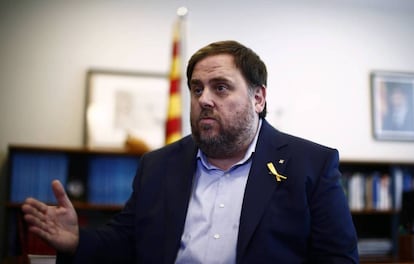Catalan leaders hold marathon meeting that yields no clear answers
Puigdemont gathered his government and other separatist leaders to discuss the effects of Article 155

The Catalan premier Carles Puigdemont, his governing team, political leaders, regional deputies and the heads of pro-independence civic groups held a seven-hour meeting last night to try to hammer out a common position with regard to the emergency measures that Madrid could roll out this weekend, effectively suspending Catalonia’s powers of self-rule.
No definitive conclusions have emerged from a marathon session that started at 9pm and ended at 2am inside the Palau de la Generalitat, the seat of the Catalan government.
You have to understand that we can’t say anything
Marta Pascal, PDeCAT
None of the the leaders who participated in the meeting were willing to make public statements. One of the first to leave was Artur Mas, Puigdemont’s predecessor and the man under whom the separatist movement got real traction at the height of the economic crisis.
“You have to understand that we can’t say anything,” said Marta Pascal, coordinator for the Catalan European Democratic Party (PDeCAT), which governs in coalition with the Catalan Republican Left (ERC), with support from the far-left CUP party.
Puigdemont, also of PDeCAT, is expected to keep making political contacts throughout Thursday morning, ahead of a two-day debate in the regional parliament that will begin this afternoon and could potentially end with a formal declaration of independence on Friday.

Divided
The lack of consensus underscores the divisions within the separatist movement. PDeCAT is the reincarnation of the former Convergència, a pro-business, center-right party that co-ruled the region for decades. Some party leaders have mixed feelings about an independence declaration, the prospect of which has already triggered a mass exodus of companies from the region.
The other major partner in the Junts pel Si governing coalition is the Catalan Republican Left (ERC), which wants an independence declaration. In an interview with The Associated Press on Wednesday, Deputy Premier Oriol Junqueras, of ERC, said that the Spanish state had left them no options other than proclaiming a republic.
Both rely for parliamentary support on the small, anti-capitalist CUP party, which wants a republic declared straight away. The CUP has vowed to fight any attempts at trading this option for an early election in the region, a move that might halt the suspension of home rule.
One leading member of PDeCAT, Santi Vila, wants any declaration of independence to come with an announcement of fresh elections. His press chief has denied, for the second time in three days, that he has resigned his position as head of the business department. Vila is reportedly well appraised of the economic situation in Catalonia, and has set up a crisis cabinet that looks at economic indicators and consults with business groups and unions periodically.
While the Catalan parliament holds its two-day session, the Spanish Senate will be convening in Madrid to approve the emergency measures proposed by the government of Mariano Rajoy last weekend. These include removing Puigdemont and his team from their posts, and calling a regional election within the next six months.
But implementing the measures will be difficult, and some Spanish political leaders are suggesting that if Puigdemont were to call elections himself and refrain from declaring independence, there would be no need for the suspension of home rule. But Spanish parties themselves seem divided on this issue.
English version by Susana Urra.
Tu suscripción se está usando en otro dispositivo
¿Quieres añadir otro usuario a tu suscripción?
Si continúas leyendo en este dispositivo, no se podrá leer en el otro.
FlechaTu suscripción se está usando en otro dispositivo y solo puedes acceder a EL PAÍS desde un dispositivo a la vez.
Si quieres compartir tu cuenta, cambia tu suscripción a la modalidad Premium, así podrás añadir otro usuario. Cada uno accederá con su propia cuenta de email, lo que os permitirá personalizar vuestra experiencia en EL PAÍS.
¿Tienes una suscripción de empresa? Accede aquí para contratar más cuentas.
En el caso de no saber quién está usando tu cuenta, te recomendamos cambiar tu contraseña aquí.
Si decides continuar compartiendo tu cuenta, este mensaje se mostrará en tu dispositivo y en el de la otra persona que está usando tu cuenta de forma indefinida, afectando a tu experiencia de lectura. Puedes consultar aquí los términos y condiciones de la suscripción digital.








































